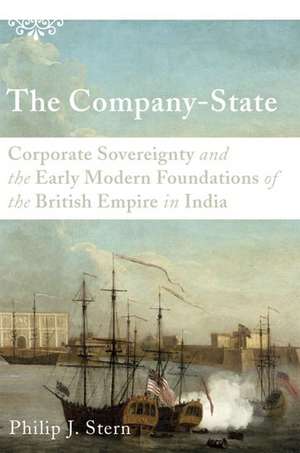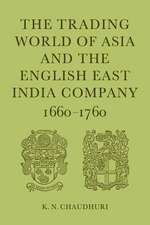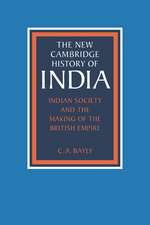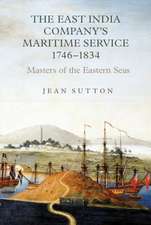The Company-State: Corporate Sovereignty and the Early Modern Foundations of the British Empire in India
Autor Philip J. Sternen Limba Engleză Hardback – 26 mai 2011
| Toate formatele și edițiile | Preț | Express |
|---|---|---|
| Paperback (1) | 293.81 lei 32-37 zile | |
| Oxford University Press – 29 noi 2012 | 293.81 lei 32-37 zile | |
| Hardback (1) | 587.96 lei 32-37 zile | |
| Oxford University Press – 26 mai 2011 | 587.96 lei 32-37 zile |
Preț: 587.96 lei
Preț vechi: 749.08 lei
-22% Nou
Puncte Express: 882
Preț estimativ în valută:
112.51€ • 120.31$ • 93.81£
112.51€ • 120.31$ • 93.81£
Carte tipărită la comandă
Livrare economică 07-12 aprilie
Preluare comenzi: 021 569.72.76
Specificații
ISBN-13: 9780195393736
ISBN-10: 0195393732
Pagini: 320
Ilustrații: 13 halftones
Dimensiuni: 236 x 168 x 31 mm
Greutate: 0.59 kg
Editura: Oxford University Press
Colecția OUP USA
Locul publicării:New York, United States
ISBN-10: 0195393732
Pagini: 320
Ilustrații: 13 halftones
Dimensiuni: 236 x 168 x 31 mm
Greutate: 0.59 kg
Editura: Oxford University Press
Colecția OUP USA
Locul publicării:New York, United States
Recenzii
With great skill, Stern has extracted from the archives a cogent and highly engaging narrative of events that even participants found highly tremendously confusing. He deftly conveys the world of the East India company, marshaling striking visual materials and wonderfully evocative quotations from a wide array of Company documents.
A thought-provoking reinterpretation that will compel us to reexamine assumptions about colonial companies in general.
In a work of deep erudition and striking originality Philip Stern deftly demolishes many of the categories by which we try to organize our work: are states and companies really different animals, were the early modern Atlantic and Indian Oceans distinct worlds, what, if anything, was new about the post-Plassey British Indian empire? We are politely but firmly directed back to the drawing board.
In The Company-State, Philip Stern has made an important contribution not only to studies of empire, but to early modern history in general. This is an important and innovative reconsideration of the East India Company as a political actor in the first phase of its career. This incisively crafted book will be widely read, cited, and debated.
A bracing re-thinking of the early modern East India Company and its role in shaping English practices of empire, governance, 'trade,' and polity, Philip Stern's book will replace all previous studies on the topic.
A thought-provoking reinterpretation that will compel us to reexamine assumptions about colonial companies in general.
In a work of deep erudition and striking originality Philip Stern deftly demolishes many of the categories by which we try to organize our work: are states and companies really different animals, were the early modern Atlantic and Indian Oceans distinct worlds, what, if anything, was new about the post-Plassey British Indian empire? We are politely but firmly directed back to the drawing board.
In The Company-State, Philip Stern has made an important contribution not only to studies of empire, but to early modern history in general. This is an important and innovative reconsideration of the East India Company as a political actor in the first phase of its career. This incisively crafted book will be widely read, cited, and debated.
A bracing re-thinking of the early modern East India Company and its role in shaping English practices of empire, governance, 'trade,' and polity, Philip Stern's book will replace all previous studies on the topic.
Notă biografică
Assistant Professor of History, Duke University






















